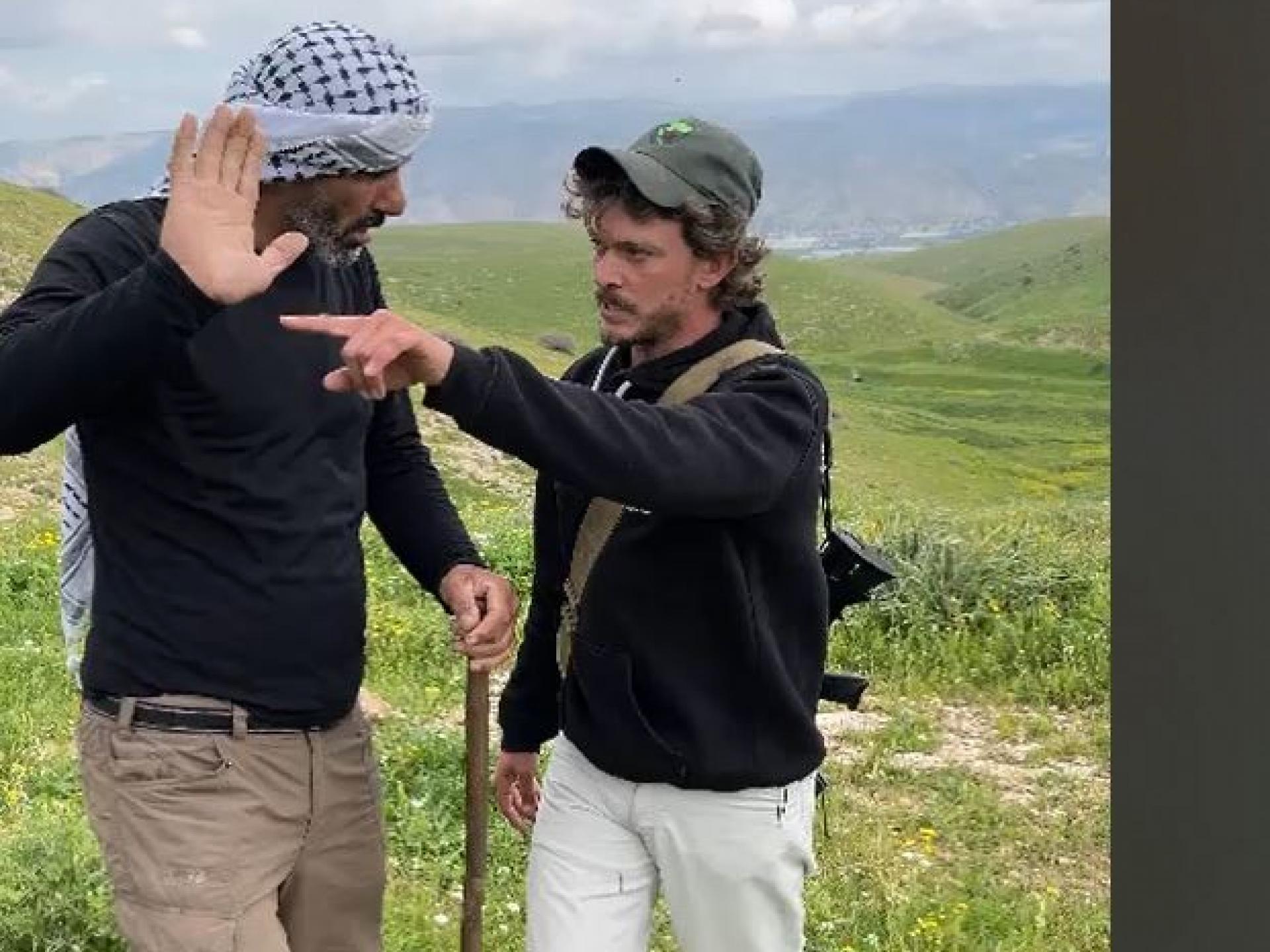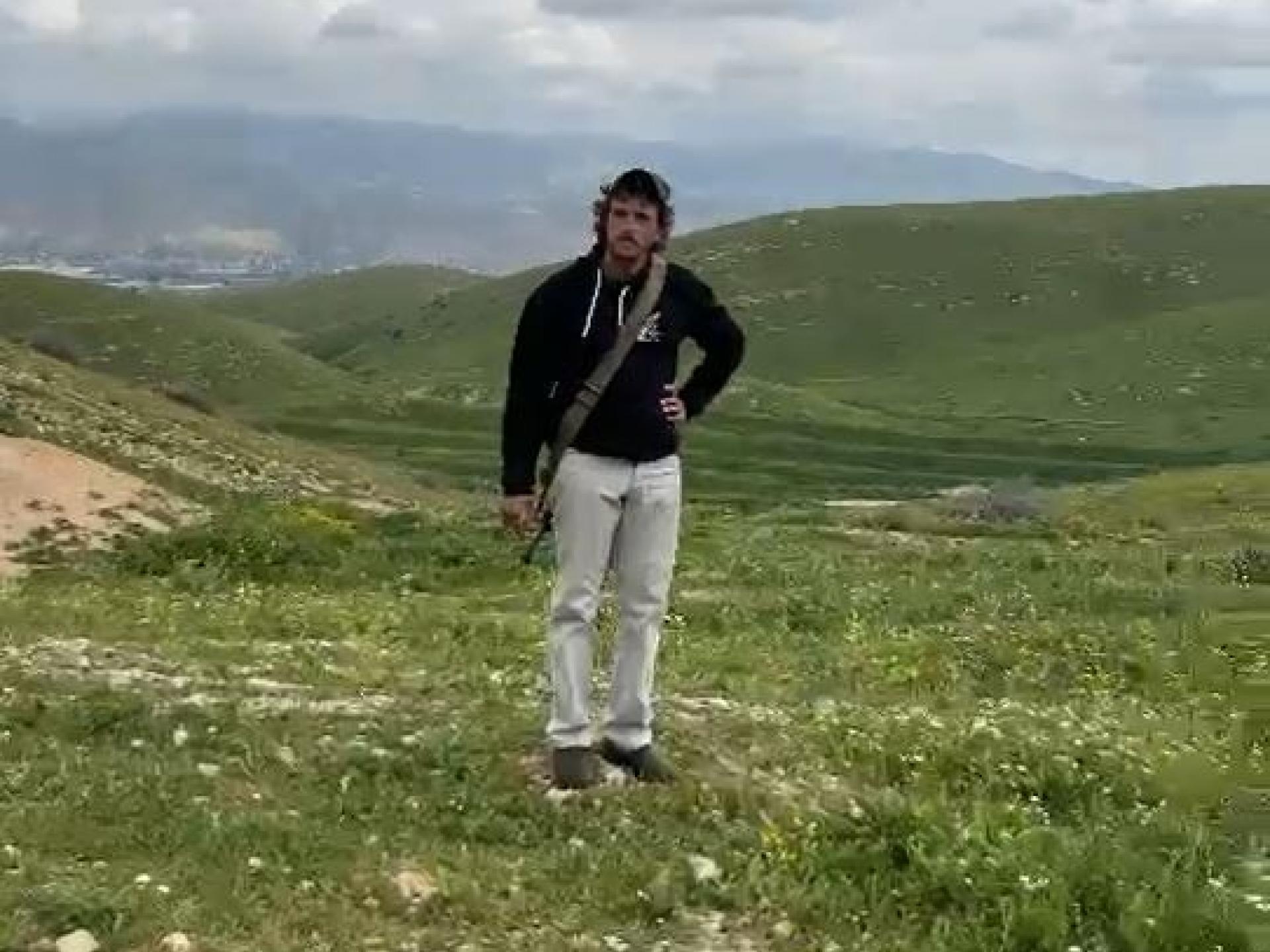Ongoing confrontations between shepherds and colonists
8 a.m. Al Farisiya
We are all volunteers coming together from the north of the country and from the venter, and immediately decided who would join the shepherd accompaniers and who would remain in the encampment as a presence vigil.
Yael, Maria and Mati went out to accompany N. who lives in the Humsa community close to Beqa’ot colony. N. has lately experienced harassments by a thug from Uri’s colony, attempting to remove him from the fertile grazing ground on the hill.
Adi and Tomer went out to accompany Najia, the wife of I., who picked some herbs for domestic use around Hemdat colony. The women were afraid that the colonists would harass them, and asked to be accompanied. They managed to pick and gather enough herbs for cooking for the Ramadan month. Adi and Tomer meant to join the grazing with N., but on the way they joined his brother who grazed down in the ravine.
Nati and Gilad went to Khalat Makhoul to accompany I. After a peaceful hour a skullcap-wearing officer suddenly appeared and declared they were in a firing zone and had to leave. I. and the accompaniers claimed that on Saturdays the firing zones are not active and one may even hike there, but that didn’t help. The officer even announced that target practice would begin there in an hour!
The shepherds changed their grazing place and hoped for a quiet continuation, but half an hour later a colonist couple arrived and claimed that I.’s flock is in grazing ground allotted the outpost of Hemdat colony. One of the colonists instructed me with “polite aggression” to leave, and none of I.’s pleas to let them another 10 minutes grazing helped. The colonist stated that this was grazing ground belonging to the outpost, but I. knows very well that this is not so.
In this part of the part, might is right, especially when backed up by an armed Israeli army officer who repeated the bit about a “firing zone” and demanded that they leave. The colonists were allowed to stay. One law for the colonist lords of the land and another for the Palestinian indigenous. I. gave up and went down to graze around the home, where vegetation is still rich and satisfying, and the sheep had plenty. The problem grows because the colonists reduce the Palestinian grazing grounds day after day in order to force them to leave, and conflicts never cease.
Reut, Jamie, Natasha and Gil accompanied A. and his flock who went out to graze with his brother and son. The brother lives with his family in Tubas and worked in Israel until October 7th. Then he decided to move to Al Farisiya and share the flock with his brother until times change. His children began to attend school in the Jordan Valley school at Ein Al Beda.
This school too is active only on Sundays and Thursdays because of the teachers’ strike that broke out because of salary stoppage (among other reasons, because Israel does not pass over money to the Palestinian Authority). On other days of the week, lessons are transmitted on Zoom, but internet is weak in this region and studies are not at their best. The families asked us to help and one of the accompaniers took upon himself a complicated mission - to get hold of old tablets and renew them for all the children or at least for some of them. In spite of the good intentions, much tension resulted around the question of equal distribution of the tablets, and in spite of blood relations (brothers, cousins), every nuclear family still cares first and foremost for its own, and relations are rapidly deteriorating.
Rachel and I, Miki, remained in Al Farisiya for protective presence, which usually included activity with the children. This time we helped them prepare for examinations in English and math. We could see that students don’t catch up with the text-book material (for example, no mastery of the multiplication table in the 5th-6th grades). The blame must be the teachers’ strike and lack of study hours. And perhaps the problem is the lower level of teachers in the periphery. Still, studies are important for the parents, so the children sit and study in order to get higher education later on. Everyone wants to become doctors and accountants and lawyers, and who knows whether shepherding would still exist…
We finished our activity by making a chocolate ‘sausage’ cake, easy and simple to make. Every family with the women and children made a cake for themselves and froze it. In the evening, when the shepherds returned, they all ate the delicious sweet cake.
Grazing was over at 4:30 p.m. and mostly went peacefully. Nati and I remained to wait for the night shift. When they arrived, an hour later, we were all invited to share the meal that breaks the Ramadan fast, with rice and meat and meluhiya, wonderful food!



